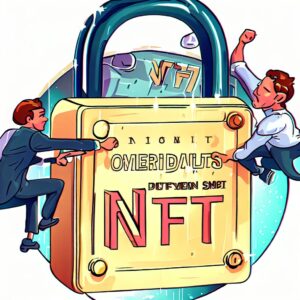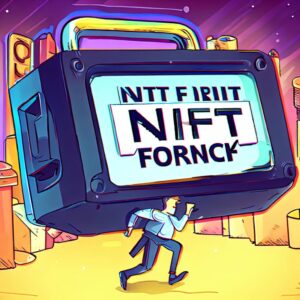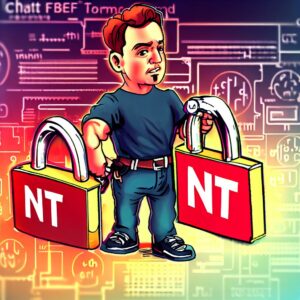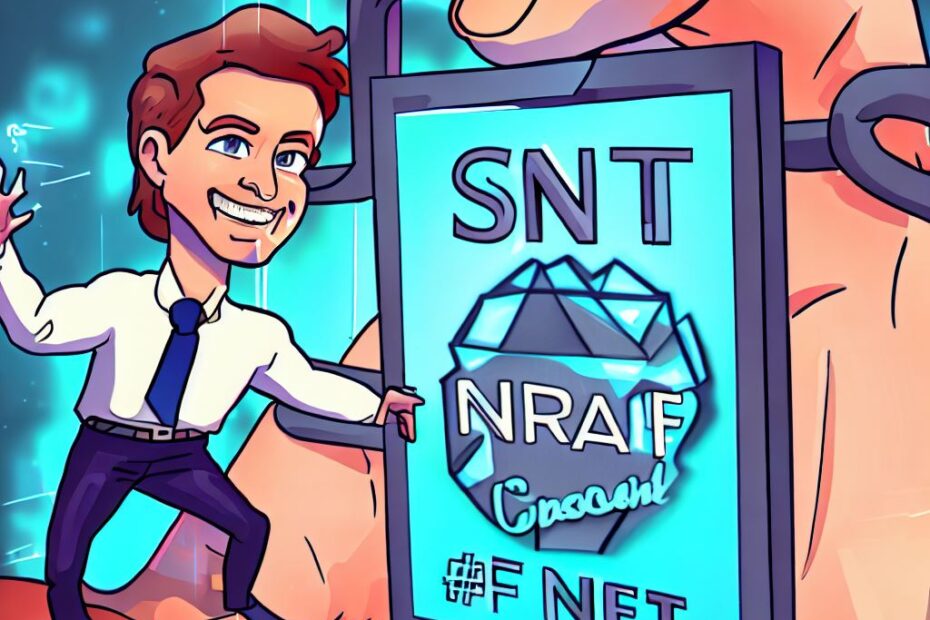In today’s rapidly evolving digital landscape, small businesses are constantly seeking innovative ways to thrive and stay ahead of the competition. One groundbreaking technology that has captured significant attention is Non-Fungible Tokens (NFTs).
What are NFTs?
NFTs, or non-fungible tokens, are a type of unique digital asset that are stored on a blockchain, which acts as a decentralized ledger to verify their authenticity and ownership. Unlike cryptocurrencies such as Bitcoin or Ethereum, which are fungible and can be exchanged on a one-to-one basis, NFTs represent something distinct, individual, and cannot be replicated.
NFTs can take many forms, including digital art, music, videos, and other types of creative content. They are often used to represent ownership of a specific piece of content, such as a rare or one-of-a-kind item, and can be bought and sold like any other asset. Because NFTs are stored on a blockchain, they are transparent, secure, and tamper-proof, making them an ideal way to verify ownership and authenticity.
One of the key features of NFTs is their ability to provide creators with a new way to monetize their work. By creating and selling NFTs, artists, musicians, and other creators can earn revenue from their digital creations in a way that was previously not possible. Additionally, NFTs can provide collectors with a new way to invest in and own unique digital assets, which can appreciate in value over time.
NFTs are a unique type of digital asset that are stored on a blockchain and represent something distinct, individual, and cannot be replicated. They provide creators with a new way to monetize their work and collectors with a new way to invest in and own unique digital assets. As the use cases for NFTs continue to expand, they are likely to become an increasingly important part of the digital economy.

The Versatility of NFTs for Small Businesses
1 – Enhancing Brand Authenticity
Small businesses can leverage NFTs to enhance their brand authenticity by creating exclusive digital collectibles, limited editions, or one-of-a-kind virtual goods that reflect their brand identity. These unique offerings can foster deeper connections with customers, establish authenticity, and create a loyal community. By using NFTs, small businesses can differentiate themselves from competitors and create a sense of exclusivity around their brand. This can lead to increased customer engagement, loyalty, and ultimately, revenue. NFTs provide a new and innovative way for small businesses to connect with their customers and establish themselves as authentic and trustworthy brands in the digital world.
2 – Expanding Revenue Streams
Small businesses can expand their revenue streams by tokenizing their products, services, or intellectual property, which enables them to create new revenue streams through the sale of NFTs. This innovative approach opens up opportunities for monetizing digital creations, licensing, fractional ownership, and royalties on secondary sales. By leveraging NFTs, small businesses can create a new market for their products and services, which can lead to increased revenue and profitability. Additionally, NFTs provide a way for small businesses to reach a global audience and tap into new markets that were previously inaccessible. This can help small businesses to grow and scale their operations, while also creating new opportunities for innovation and creativity. Overall, NFTs offer small businesses a powerful tool for expanding their revenue streams and unlocking new growth opportunities in the digital economy.
3 – Increasing Engagement
NFTs offer small businesses a unique opportunity to increase customer engagement by incentivizing participation in interactive campaigns, contests, or giveaways. By rewarding customers with digital assets that hold value and exclusivity, small businesses can drive participation, word-of-mouth marketing, and customer loyalty. This approach creates a win-win situation for both the business and the customer, as customers are incentivized to engage with the business in exchange for valuable digital assets, while the business benefits from increased engagement, brand awareness, and customer loyalty. Moreover, NFTs provide a way for small businesses to create personalized experiences for their customers, which can help to build stronger relationships and foster a sense of community around the brand. Overall, NFTs offer small businesses a powerful tool for increasing engagement and building long-term relationships with their customers.
4 – Facilitating Crowdfunding and Investments
NFTs offer entrepreneurs a unique opportunity to facilitate crowdfunding and investments by serving as digital representations of equity or ownership in a small business. By creating tokenized crowdfunding campaigns, entrepreneurs can raise capital while granting investors access to future profits and a stake in the venture’s growth. This approach creates a win-win situation for both the entrepreneur and the investor, as the entrepreneur is able to secure funding for their venture while the investor is able to invest in a potentially lucrative opportunity. Moreover, NFTs provide a way for entrepreneurs to create a sense of exclusivity and ownership around their venture, which can help to build a community of supporters and advocates. Overall, NFTs offer entrepreneurs a powerful tool for raising capital and building a strong network of investors and supporters.

Steps to Get Started with NFTs
1 – Define Your Objective
To effectively leverage NFTs for your business, it’s crucial to define your objective and determine how they align with your broader business goals. Ask yourself what you hope to achieve through NFTs – are you looking to enhance brand awareness, drive revenue, engage customers, or explore new funding avenues? By clearly defining your objective, you can tailor your NFT strategy to meet your specific needs and maximize your return on investment.
For example, if your goal is to drive revenue, you may want to consider creating limited edition NFTs that offer exclusive access to products or services. Alternatively, if your goal is to enhance brand awareness, you may want to focus on creating NFTs that showcase your brand’s unique personality and values. Whatever your objective may be, taking the time to define it will help you create a more effective NFT strategy that delivers real results for your business.
2 – Create Unique Digital Assets
When creating NFTs, it’s important to consider what type of digital assets will best represent your brand or offerings. This can include a wide range of options, such as artwork, digital collectibles, virtual experiences, or even exclusive access to services. By creating unique digital assets that align with your brand’s values and personality, you can differentiate yourself from competitors and attract a loyal following of NFT collectors.
For example, if you’re a fashion brand, you may want to create NFTs that showcase your latest collection or offer exclusive access to limited edition pieces. Alternatively, if you’re a gaming company, you may want to create NFTs that offer unique in-game experiences or rare virtual items. Whatever type of digital assets you choose, make sure they are truly unique and valuable to your target audience to maximize the potential of your NFT strategy.
3 – Choose the Right Blockchain Platform
When it comes to creating and selling NFTs, choosing the right blockchain platform is crucial. You’ll want to select a reliable platform that supports NFTs and aligns with your business requirements. There are several popular blockchain platforms to choose from, including Ethereum, Binance Smart Chain, and Flow. Each of these platforms offers a robust ecosystem and marketplace for minting, trading, and selling NFTs.
Ethereum is the most widely used blockchain platform for NFTs, offering a high level of security and flexibility. Binance Smart Chain is a newer platform that offers faster transaction speeds and lower fees. Flow is a blockchain platform specifically designed for NFTs and offers unique features such as built-in royalties and a focus on community-driven marketplaces. Ultimately, the platform you choose will depend on your specific needs and goals for your NFT strategy.
4 – Ensure Legal Compliance
It is crucial to ensure legal compliance when dealing with any new technology, and NFTs are no exception. It is important to have a clear understanding of the legal implications of NFTs to avoid any potential legal issues. Seeking legal counsel is highly recommended to navigate the complex landscape of intellectual property rights, licensing agreements, securities regulations, and tax considerations. Intellectual property rights are particularly important to consider when creating and selling NFTs, as they involve unique digital assets that may be subject to copyright laws.
Licensing agreements are also important to ensure that you have the necessary rights to use and sell the underlying assets of your NFTs. Securities regulations and tax considerations are also important to consider, as they can have significant implications for your NFT strategy. By ensuring legal compliance, you can protect yourself and your business from potential legal issues and ensure that your NFT strategy is successful.
5 – Market and Promote Your NFTs
To maximize the visibility and success of your NFT offerings, it is crucial to effectively market and promote them. Utilize your existing marketing channels, such as social media, email newsletters, and partnerships, to generate awareness and reach a wider audience. Engage with your audience by providing value and highlighting the unique aspects of your digital assets.
This can include showcasing the rarity, authenticity, and exclusivity of your NFTs, as well as any special features or benefits they offer. Additionally, consider collaborating with influencers or other brands to expand your reach and tap into new audiences. By effectively marketing and promoting your NFTs, you can increase their perceived value and attract more buyers, ultimately leading to greater success in the NFT marketplace.

Conclusion
NFTs present an unprecedented opportunity for small businesses to embrace the digital economy, unlock new revenue streams, and engage with customers in unique ways. By leveraging NFTs to enhance brand authenticity, expand revenue streams, increase engagement, and facilitate crowdfunding, small businesses can position themselves at the forefront of this transformative technology.
